 Petzlover
Petzlover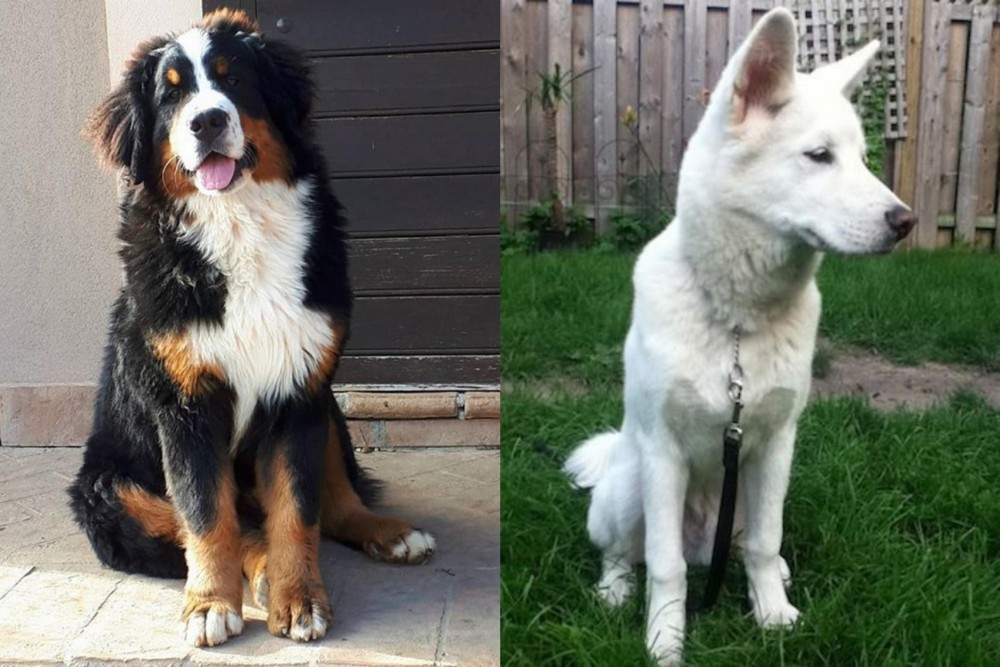 Mountain Burmese is originated from Myanmar but Phung San is originated from North Korea. Mountain Burmese may grow 11 cm / 5 inches higher than Phung San. Mountain Burmese may weigh 39 kg / 86 pounds more than Phung San. Mountain Burmese may live 6 years less than Phung San. Both Mountain Burmese and Phung San has almost same litter size. Mountain Burmese requires Low Maintenance. But Phung San requires Moderate Maintenance
Mountain Burmese is originated from Myanmar but Phung San is originated from North Korea. Mountain Burmese may grow 11 cm / 5 inches higher than Phung San. Mountain Burmese may weigh 39 kg / 86 pounds more than Phung San. Mountain Burmese may live 6 years less than Phung San. Both Mountain Burmese and Phung San has almost same litter size. Mountain Burmese requires Low Maintenance. But Phung San requires Moderate Maintenance
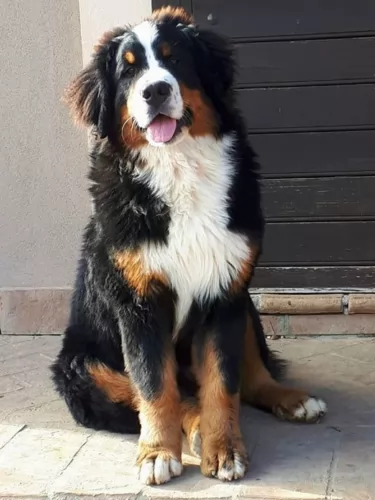 The Burmese Mountain Dog is quite often taken to be the Bernese Mountain Dog, a Swiss farm dog. However, the Burmese Mountain Dog comes not from Switzerland but from Myanmar and Burma. The Burmese was bred to hunt skunks and guard livestock for the northern tribesman of Myanmar. The way they hunted for the aggravating skunks was to hide themselves in the underbrush and wait for the skunk to go by. Their facial markings confuse skunks when they see him in the bush with a black and white face. At the same time, his rust color lets the hunter know he is the dog not the skunk.
The Burmese Mountain Dog is quite often taken to be the Bernese Mountain Dog, a Swiss farm dog. However, the Burmese Mountain Dog comes not from Switzerland but from Myanmar and Burma. The Burmese was bred to hunt skunks and guard livestock for the northern tribesman of Myanmar. The way they hunted for the aggravating skunks was to hide themselves in the underbrush and wait for the skunk to go by. Their facial markings confuse skunks when they see him in the bush with a black and white face. At the same time, his rust color lets the hunter know he is the dog not the skunk.
The Mountain Burmese is an incredible athlete despite the size. They are agile. They are quick. They can climb trees – as many as fifty feet while chasing a skunk. They also make a great companion and love to be a family dog. They are calm and gentle as an adult and great with kids. They are easily trained but remember they can climb trees. However, they do not do well with cats that are black and white or solid black because they confuse them with the skunk prey.
 The Phung San, Pungsan or ‘Poongsan dog’ is native to Korea. Outside of Korea, this dog is virtually unheard of.
The Phung San, Pungsan or ‘Poongsan dog’ is native to Korea. Outside of Korea, this dog is virtually unheard of.
The origin of the dog goes back to the 16th century, but there aren’t many records of where the breed descended from. Some dog experts believe the breed descends from Siberian Laika dogs while others say they are a mix of Mastiff and Herding breeds. It is believed that the Pungsan has been used for hunting large predators.
It was during the Japanese occupation of North Korea that the breed was declared a national treasure.
The Phung San isn't recognized by any major kennel clubs.
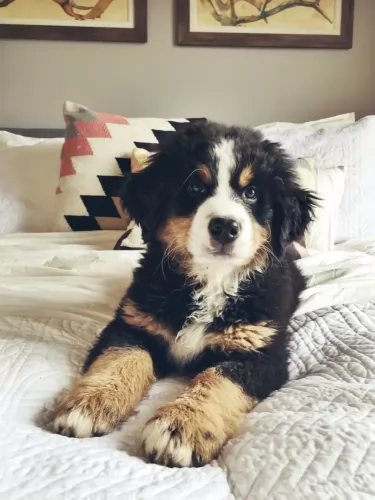 The Mountain Burmese Dog is a large, sturdy, well built and athletic canine. Strong and well balanced, he is agile and athletic when it comes to the work, he has to do in chasing skunks. He has a full body with a large head and dark, oval eyes. The Burmese has triangular ears close to his head and medium in size. With a flat, broad skull the muzzle is straight and strong. They have black noses and a scissors bite, on their muscular, strong neck. With a deep chest and broad back, they have strong ribs. Finally, the tail is bushy, long and hangs low.
The Mountain Burmese Dog is a large, sturdy, well built and athletic canine. Strong and well balanced, he is agile and athletic when it comes to the work, he has to do in chasing skunks. He has a full body with a large head and dark, oval eyes. The Burmese has triangular ears close to his head and medium in size. With a flat, broad skull the muzzle is straight and strong. They have black noses and a scissors bite, on their muscular, strong neck. With a deep chest and broad back, they have strong ribs. Finally, the tail is bushy, long and hangs low.
 This is a Spitz-type dog and it is considered to be medium to large size. He is an athletic, muscular dog with a deep chest standing at 57 to 60cm in height and weighing roughly between 25 and 30kg.
This is a Spitz-type dog and it is considered to be medium to large size. He is an athletic, muscular dog with a deep chest standing at 57 to 60cm in height and weighing roughly between 25 and 30kg.
The legs are nice and straight, the ears erect and the bushy tails curls up over the back.The head is fairly triangular in shape, the nose is black and the eyes are brown, bright and alert.
The coat is thick and comes in different shades of white and cream.
These dogs are such loyal, devoted pets. They’re independent dogs and will benefit from being trained and socialized. With this kind of training they can get on well with children in the home. They can be quite snooty with strangers but they’re good watchdogs.
 Your Phung San dog is a strong-willed dominant type of dog, and training and socialization will do him the world of good in terms of making him obedient and well mannered. He is loyal, faithful and loving and protects and guards those he loves.
Your Phung San dog is a strong-willed dominant type of dog, and training and socialization will do him the world of good in terms of making him obedient and well mannered. He is loyal, faithful and loving and protects and guards those he loves.
Some people say these dogs aren’t a good choice for novice dog owners, but dogs essentially turn out the way their owners are. The right upbringing will ensure your Pungsan Dog is a good pet for new owners and for families with children.
Do research and you’ll see that these beautiful dogs make splendid pets and companions.
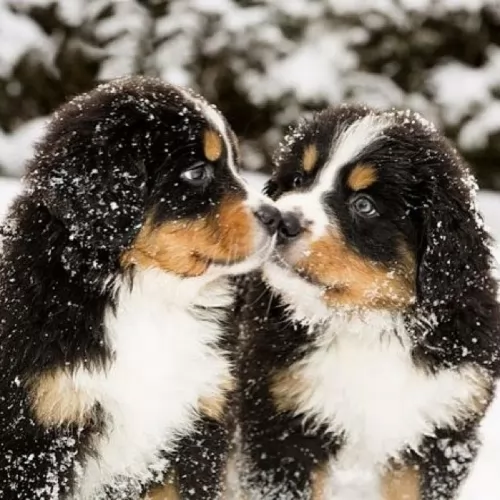 The kind of health issues that most large or giant dogs have to deal with are some of the same things that this breed dealt with.
The kind of health issues that most large or giant dogs have to deal with are some of the same things that this breed dealt with.
 Able to get to 13 or 14 years of age, the Pungsan dog enjoys good health, but there are some dog diseases that it is good to be aware of -
Able to get to 13 or 14 years of age, the Pungsan dog enjoys good health, but there are some dog diseases that it is good to be aware of -
Hip Dysplasia can mean no more games for your pet. It’s a disease that can have a large impact on your pet’s quality of life. It’s not reserved for old dogs either but it affects medium to large breed dogs.
Diet, weight of dog, genetics and environmental factors can all cause hip dysplasia, and while the symptoms are often subtle at first, you’ll see a limp starting and your dog holding his leg up off the ground. The severity of symptoms can change from day to day but the pain can be severe and you will need to get your pet to the vet.
This is an eye problem where the eyelids roll too far inwards and then scrape on the surface of the eye, possibly leading to corneal scarring and painful eye infections.
This is a life threatening illness where the stomach bloats up with gas and the stomach can actually twist. Your pet will be restless, panting and acting out of character and absolutely no time should be wasted getting your pet to the vet.
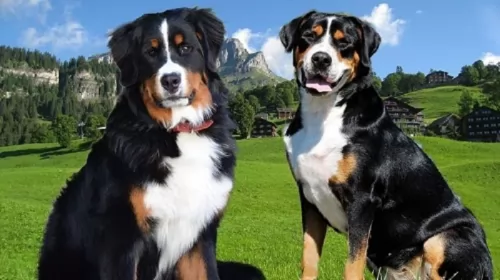 Feed a high quality dog food designed for large or giant puppies. Feed 3times a day 2.5 times for puppies and go easy on the treats
Feed a high quality dog food designed for large or giant puppies. Feed 3times a day 2.5 times for puppies and go easy on the treats
There is a definite tendency for these dogs to become obese. Don’t overfeed. Don’t free feed. Large breed high quality dog food should be fed 2 times a day and go easy on the treats. Watch his weight.
strength, stamina
The breed is definitely athletic and active. They love to chase and take long walks daily. They need a large yard but be careful as they can climb trees and your fence. They are great companions when backpacking and camping. If there are skunks in the area however watch out! These are hunting dogs despite their size and they would do very well in barn hunt and field trials.
 This is an active, energetic dog that will require some vigorous physical activity each day. While a walk is an excellent form of exercise, he will need something more hectic. You can take him to the park and allow him to run free off his leash, take him with you on your hikes and play ball- or frisbee games with him.
This is an active, energetic dog that will require some vigorous physical activity each day. While a walk is an excellent form of exercise, he will need something more hectic. You can take him to the park and allow him to run free off his leash, take him with you on your hikes and play ball- or frisbee games with him.
Your Pungsan sheds quite a bit because the fur is thick and you will need to have him brushed at least twice a week. Turn this brushing session into a proper grooming session. There are several things to check during these brushing sessions which your pet will love -
Run your hands over him and check for any unusual lumps.
Look inside his mouth and check his teeth. Your pet can’t tell you that there is a rotting tooth causing tremendous pain and illness.
Check the inside of his ears and make sure they aren’t red and clogged with excess wax and debris. There are ways to clean them and if you don’t know how or you don’t want to, allow a professional groomer to check his teeth, inside his ears and also trim his nails.
Make sure he has an excellent diet. There are some really good commercially manufactured dog foods that have the right balance of vitamins and minerals in them. Give him some home-made food too. Nothing exotic and spicy – just wholesome, simple food that won’t upset his stomach – boiled chicken, brown rice or pasta and some sweet potato, carrots and spinach. Mix these into his kibble from time to time. Once in a while you can also give him some raw meat. Make sure he has easy access to fresh, cool water.